Fushan Academy celebrates its 10th anniversary

Fushan Academy of Qingdao University hosted a grand evening party on Dec 18 to celebrate its 10th anniversary as well as to greet the upcoming New Year in the eastern coastal city of Qingdao, Shandong province.
More than 200 distinguished guests took part in the event, including officials from Qingdao municipal publicity department, the Chinese Association for Suzhi Education and Qingdao University, as well as scholars from Sichuan University and the Confucius Institute.

Students from Fushan Academy of Qingdao University display traditional tea art at the academy's 10th anniversary party on Dec 18 in Qingdao, Shandong province. [Photo provided to chinadaily.com.cn]
The ceremony was carefully orchestrated by the students of the academy, staging traditional Chinese dances, music performances, poetry reading and an endearing stage play.
Fushan Academy was established in 2007 by Qingdao University as a platform to promote liberal arts education. It is designed as an approach to curb the trend towards vocation-oriented education, and to convert general students into well rounded individuals through self-awareness and self-actualization.

Students from Fushan Academy of Qingdao University perform poetry reading at the academy's 10th anniversary party on Dec 18 in Qingdao, Shandong province. [Photo provided to chinadaily.com.cn]
Liberal arts education is becoming the most important means of undergraduate education reform exercised by numerous universities in China which emphasizes fewer students per class, allowing for closer interaction between teachers and students. In regards to the course content, both arts and sciences received a balanced approach. There is strong emphasis on critical thinking and creativity.
According to an official from Qingdao University, this kind of small learning community makes it more convenient for students to engage in self-exploration and to develop closer relationships with their teachers and peers. It also helps them participate actively in campus life and establish social networks. Teachers play a pastoral role while living and dining with students, which is completely different from most of today's large and research-intensive universities.
MOST POPULAR
- 1 China to give visa-free treatment to another 9 countries
- 2 China fully opens manufacturing sector to foreign investors in landmark opening up move
- 3 China's import expo attracts record-breaking participating countries, exhibitors
- 4 China's door opening even wider to foreign visitors, businesses
- 5 China revises rules to ease foreign strategic investment in listed firms
Editors' Picks
 Video:
Peru sees new port open
Video:
Peru sees new port open
 Infographic:
China's public holidays for 2025
Infographic:
China's public holidays for 2025
 Infographic:
Basic facts of APEC
Infographic:
Basic facts of APEC
 Infographic:
Wrapping up the 7th CIIE: Data recap
Infographic:
Wrapping up the 7th CIIE: Data recap



